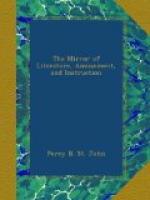offices among mankind, constituted his occupations
until recent events drew him from his privacy.
The first call was made by the Russian functionaries,
as stated in the text, for the purpose of self-protection!
the second was that of his devoted country, when
a government was essential to success. He was
chosen not only one of the five members of the
executive body, but its president, a station which
he still honourably fills. Into his new office
he has carried all the unostentatious and disinterested
virtues that adorned Pulawy, and there is little doubt
that if (and no one suspects that such will not be
the case) the independence of Poland be fairly
won, the choice of his country will point to him
as its sovereign. Having finished his academical
career at the University of Edinburgh, he early acquired
a strong taste for English institutions and for Englishmen,
and of this he gave substantial proof by devoting
250 l. a-year to the exclusive purchase of English
books. His revenues are enormous; but his
liberality is unbounded; and, as it is a rule
in his munificent establishment to provide liberally
for the families of all his dependants, his means are
comparatively restricted, but his personal wants
are few; and that he is ready to accommodate himself
to circumstances, was well shown by his only observation
on hearing of the confiscation of his large property
in Podolia by Nicholas. “Instead of
riding, I must walk, and instead of sumptuous fare,
I must dine on buck-wheat."[3] Such is a faint
outline of this illustrious man’s character.
Were it only for the admirable example of such
an individual guiding the reigns of the government
of a devoted people, it is most ardently to be hoped
that Poland may triumph over her enemies, and be
raised to that rank from which she was degraded
only by the basest of treasons.—
Fletcher’s
History of Poland.
[3] The common food of the
poor.
As the pronunciation of the Polish language is attended
with some difficulty, the author of this work has,
in his advertisement, subjoined the following hints,
taken principally from the “Letters Literary
and Political on Poland, Edinburgh, 1823.”
All vowels are sounded as in French and Italian; and
there are no diphthongs, every vowel being pronounced
distinctly. The consonants are the same as in
English, except
w, which is sounded like v, at the beginning
of a word; thus, Warsawa—Varsafa;
in the middle or at the end of a word it has the sound
of f, as in the instance already cited; and
Narew—Nareff.
c, like tz, and never like k;
thus, Pac is sounded Patz.
g, like g in Gibbon; thus, Oginski.
ch, like the Greek [Greek: ch] or k;
thus, Lech—Lek.
cz, like the English tch in pitch;—thus,
Czartoryski pronounce Tchartoryski.
sz, like sh in shape; thus, Staszyc
like Stashytz.




